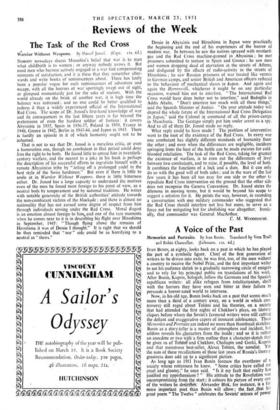Reviews of the Week
The Task of the Red Cross
Warrior Without Weapons. By Marcel Junod. (Cape. z2s. 6d.) NOBODY nowadays shares Mussolini's belief that war is to men what childbirth is to women ; or anyway nobody avows it. But most men who become actively engaged in a war find compensating moments of satisfaction, and it is these that they remember after- wards and write books of reminiscences about. There has lately been a popular vogue for such reminiscences of adventure and escape, with all the horrors of war sportingly swept out of sight, or glimpsed momentarily just for the sake of realism. With the world already on the brink of another war, it is high time the balance was redressed ; and no one could be better qualified to redress it than a widely experienced official of the International Red Cross. The scope of Dr. Junod's first-hand knowledge of war and its consequences in the last fifteen years is far beyond the pretensions of even the hardiest soldier of fortune: it covers Abyssinia in 1935, Spain in 1936-37, Poland in 1939, France in 1940, Greece in 1942, Berlin in 194344, and Japan in 1945. There is hardly an episode in it of which humanity ought not to be ashamed.
That is not to say that Dr. Junod is a merciless critic, or even a humourless one, though no combatant in that period could deny him the right to be both. He found little to amuse him in twentieth- century warfare, and the nearest to a jokz in his book is perhaps the description of his successful efforts to ingratiate himself with a remote Abyssinian tribe by " letting off a prolonged yodel in the best style of the Swiss herdsmen." But even if there is little to smile at in Warrior Without Weapons, there is little bitterness either. Dr. Junod has a large capacity to understand the motives even of the men he found most foreign to his point of view, as a neutral both by temperament and by national tradition. He writes with notable generosity of the British authorities' attitude towards the non-combatant victims of the blockade ; and there is almost no nationality that has not earned some degree of respect from him through individuals serving under the Red Cross. Moral disgust is an emotion almost foreign to himtand one of the rare moments when he comes near to it is in describing his flight over Hiroshima in September, 1945: " Though flying above the remains of Hiroshima it was of Dessie I thought." It is right that we should be thus reminded that 'Y our " side could be as horrifying to a neutral as " theirs." Dessie in Abyssinia and Hiroshima in Japan were practically the beginning and the end of his experiences of the horror of modern war. In between he saw the natives sprayed with mustard- gas and the Red Cross machine-gunned in Abyssinia ; he met prisoners submitted to torture in Spain and Greece ; he saw men and women dropping dead of starvation in the streets of Athens, and disfigured by the effects of radio-activity in the streets of Hiroshima ; he saw Russian prisoners of war treated like vermin in German camps, and senior British and American officers reduced to the behaviour or mechanical slaves in Japan. And again and again the Herrenvolk, whichever it might be on any particular occasion, warned him not to interfere. " The International Red Cross would' have done better not to interfere," said Badoglio in Addis Ababa. "Don't interfere too much with all these things," said the Spanish Minister of Justice. " On your attitude today will depend the whole future of the International Red Cross Delegation in Japan," said the Colonel in command of all the prison-camps in Manchuria. The Gestapo simply put him under arrest as a spy. And to all of them Dr. Junod made no reply.
What reply could he have made ? The problem of intervention went to the root of the existence of the Red Cross. In every war one combatant has slightly different standards of humanity from the other ; and even when the differences are negligible, incidents springing from the heat of the battle can be made excuses for cold- blooded retaliation. The task of the Red Cross, taking for granted the existence of warfare, is to even out the differences of level between two combatants, and to raise, if possible, the level of both.
It combines the functions of a lock and a dam. But it can only do so with the good will of both sides ; and in the wars of the last few years it has been all too easy for one side or the other to repudiate Red Cross intervention on the ground that the other side does not recognise the Geneva Convention. Dr. Junod states the dilemma in moving terms, but it would be beyond his scope to suggest a solution for it. He points the way, however, in recording a conversation with one military commander who suggested that the Red Cross should interfere not less but more, to serve as a force not for mitigating but for abolishing war altogether. Ironic- ally, that commander was General MacArthur.
C. M. WOODHOUSE.


































 Previous page
Previous page